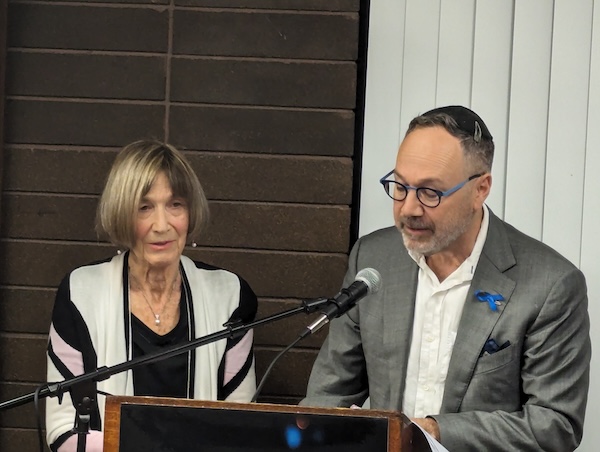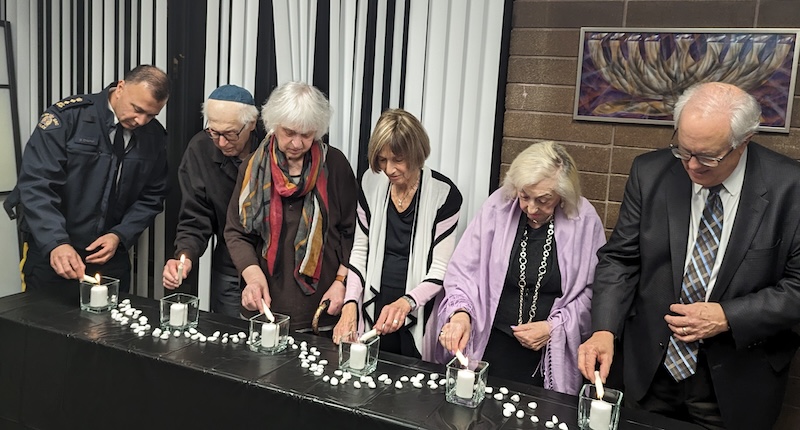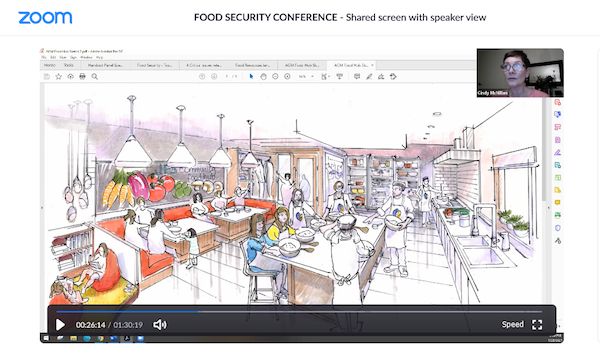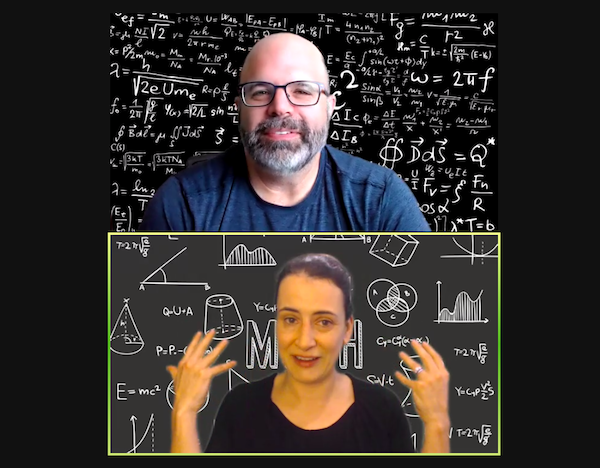Richmond RCMP Chief Superintendent Dave Chauhan, left, lights memorial candles with survivors David Schaffer, Sidi Schaffer, Amalia Boe-Fishman and Ilona Mermelstein, and Richmond Mayor Malcolm Brodie at a commemoration of International Holocaust Remembrance Day, at the Bayit, in Richmond, on Jan. 25. (photo by Pat Johnson)
Amalia Boe-Fishman was born in Leeuwarden, in the Netherlands, days before the start of the Second World War. Her mother’s parents and siblings had made aliyah to Israel in the early 1930s, but her mother, Johanna, stayed behind to pursue a career in nursing. Working in the Jewish hospital, she met Arnold van Kreveld, a patient who had been in a motorcycle accident, and they fell in love.
The couple married in 1935 and their first child, David, nicknamed Dik, was born in 1937. Amalia arrived Aug. 23, 1939.
“We had a good life, family, friends and neighbours,” Boe-Fishman said. But then, in May 1940, the German army invaded the Netherlands.
Boe-Fishman shared the story of her family’s survival at a commemoration of International Holocaust Remembrance Day, at the Bayit, in Richmond, on Jan. 25.
After the Nazis overran the Netherlands, her father’s parents and siblings were deported to Westerbork, a Nazi transit camp in the Netherlands, on Sept. 3, and on to Auschwitz, where they were immediately murdered, on Sept. 7.
Her father was a scientist and his young research assistant, Jan Spiekhout, a member of the Dutch resistance to the Nazis, would save the lives of the entire van Kreveld family.
“Jan Spiekhout found immediately an address for my father to go into hiding,” Boe-Fishman recalled. “He then found different hiding addresses for my mother, another address for my brother and then one for myself.”
Amalia was not yet a year old and her parents knew they might never see their children again.
“My mother gave me a special doll to keep me company and a letter I brought with me so my new family would understand her little girl a little better,” said Boe-Fishman. “In the letter, [she] told them how fond I was of my older brother Dik. If my parents would not survive the war, the Holocaust, to send us together to Israel to stay with one of my mother’s sisters.”
Amalia was taken to the home of Spiekhout and his parents, Durk and Froukje Spiekhout. The crowded and deeply religious Dutch Reformed household already had six children, of which Jan was the eldest. The younger Spiekhout children were told that Amalia was the daughter of a sick aunt in Rotterdam.
“They became my family,” said Boe-Fishman. “Father Spiekhout took a great risk bringing me into his household. He was a policeman. After all, policemen were supposed to work for the Nazis and round up Jews.”
She learned later that he instead warned Jewish neighbours of impending Nazi roundups.
“My father, typically Jewish looking, with dark hair, went from hiding place to hiding place – at least 26 different addresses,” Boe-Fishman said. “All at night and all arranged by Jan Spiekhout. My mother, not so typically Jewish looking, did not need to flee so often.
“As for myself, I don’t know what I remember or what I was told later on,” she said. “I was not allowed to go outside and I had to stay indoors for three years.”
On April 15, 1945, Canadian forces liberated Leeuwarden.
“What did that mean for me?” she asked. “Liberation should have been a really happy time for me. I was told that I could go outdoors. I didn’t know what to expect, what was waiting for me outdoors. Indoors had become my entire life. Indoors was where I felt secure and safe. Indoors was all I knew.”
Greater change was to come.
“I was told I had a real family and I was told I was going home,” she said. “But who were those people, who were those strangers? I did not want to leave the family Spiekhout. They were my real family and I loved them. My own father and mother were patient with me. They would come over to visit and I would run away or hang onto Mother Spiekhout screaming, ‘I don’t want to go home!’”
Dik, who was now 7-and-a-half, was also a stranger to little Amalia. Most incredibly, and at profound danger, a younger sibling had been born in hiding, a baby named Jan, in honour of the family’s saviour.
The name Jan has profound resonance in the family. Amalia’s oldest son, who joined her at the commemoration, was born in 1962 and is also named Jan.
That the entire immediate family had survived the Holocaust – had grown, in fact – was almost inconceivable. Dutch Jews had one of the lowest survival rates during the Holocaust. The van Krevelds owed everything to the Spiekhout family who, in 2008, were recognized as Righteous Among the Nations by Yad Vashem’s Holocaust Martyrs’ and Heroes’ Remembrance Authority. Boe-Fishman and her children attended a ceremony honouring the Spiekhouts in The Hague in 2009.
In 1961, Boe-Fishman (then van Kreveld) went to Israel trying to find her Jewish identity. The Eichmann trial was taking place at the time, which cracked open consciousness of the Holocaust not only for most of the world, but for survivors, including her family, who had remained almost entirely silent on the subject. In Israel, she met and married a Canadian Jew from Vancouver and settled here becoming, among other things, a devoted speaker to class groups and others about her Holocaust experiences.

Rabbi Levi Varnai of the Bayit contextualized Boe-Fishman’s presentation.
“I think that this year – every year, but this year maybe more than any year – with all the craziness in the world, this event is even more important than ever before,” he said.
Keith Liedtke, president of the Bayit, served as master of ceremonies and credited Michael Sachs, now regional director for Jewish National Fund of Canada, for starting the tradition five years ago of inviting the mayor to recognize Holocaust Remembrance Day annually.
Cantor Yaakov Orzech chanted El Moleh Rachamim. Richmond’s Mayor Malcolm Brodie read the proclamation and reflected on Boe-Fishman’s experiences. RCMP Chief Superintendent Dave Chauhan joined the mayor and survivors in lighting memorial candles. Liedtke read a message from Steveston-Richmond East Member of Parliament Parm Bains. Kelly Greene, member of the Legislative Assembly for Richmond-Steveston, brought greetings from Premier David Eby. Also in attendance were Richmond South Centre MLA Henry Yao and Richmond city councilors Chak Au, Andy Hobbs and Bill McNulty.
In addition to the Bayit, the event was presented with the Vancouver Holocaust Education Centre, Centre for Israel and Jewish Affairs, Kehila Society of Richmond and Jewish Federation of Greater Vancouver.



